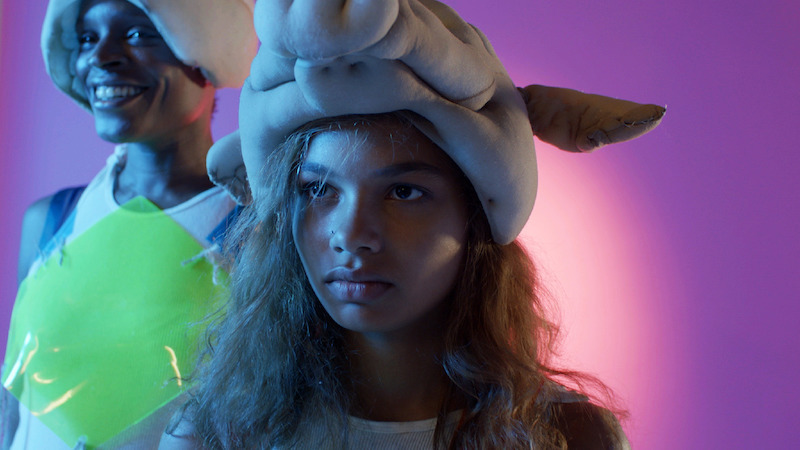
It’s hard to properly describe Josephine Decker’s Madeline Madeline. If I were to merely recount the plot—a troubled but brilliant girl gets deeply involved with a cult-like experimental theater troupe, much to the consternation of her mother—it would sound almost conventional, but it’s anything but. Instead, Decker combines dream-like imagery, improvisation, and even some elements of horror to create a thoroughly singular cinematic experience.
Molly Parker, as the charismatic but exploitative director of the troupe, and Miranda July, as the overly protective mother (they are presented as unwitting doppelgängers of each other) are both wonderful. But it’s newcomer Helena Howard, as Madeline, who gives an utterly mesmerizing, star-making performance.
When we first meet Madeline, she’s acting like a cat. But not in a child-like “meow” sort of way. She is the cat. She slinks and purrs and undulates against furniture. Her mother is both slightly put-off by the commitment of Madeline’s impersonation and grateful to have any opportunity to nuzzle with her daughter. Later, though, the scene turns dark, as Madeline contemplates scalding her mother with a hot iron. But is that part a dream?
Decker is not afraid to completely destabilize her audience, which is one of the many ways the film keeps you in its thrall. Images are blurry; murmurs, chants, and ambient sound overtakes dialogue; dreams snap into reality and back to dreams again.
The beautiful, wild-maned Madeline, who suffers from bulimia and takes medicine for cutting, is alienated from her mother, who alternately smothers and scolds her and seems completely at a loss for what to do with this creative, disturbed, brilliant child of hers.
Meanwhile, at the improv troupe, Parker’s Evangeline sees Madeline both as a surrogate daughter and a ticket to personal glory of sorts. The more obsessed she becomes with Madeline, the more she begins to ignore the rest of her troupe, who are simultaneously jealous of Evangeline’s straying attention and sensitive enough to see that something inappropriate is happening here. Evangeline takes a perverse fascination in hearing about Madeline’s dysfunctional relationship with her mother—she flatters herself into thinking she’s the mother superior, as it were—and she wants to explore it and exploit it, at one point bringing Madeline’s actual mother into the troupe for some very charged role-playing. (July is wonderful in these scenes—tentative, hopeful, and ultimately betrayed by Evangeline’s cruel manipulations.) But Evangeline is completely careless with Madeline’s emotional health, pressing Madeline to go deeper and darker into her own psyche, with little concern for the consequences.
Watching the film, we worry for Madeline—in one particularly upsetting scene, she dons these grotesque, soft-plush pig masks the troupe sometimes wears and stomps down the streets, terrorizing people—but we have faith in her too. She is trying to find her voice as a real artist and her place in the world as a daughter, girlfriend, friend. By the end of the film, Madeline has become a leader of sorts, forging her own path, distinct from her needy mothers. And Helena Howard is astonishing in the part, taking risks along with her bold director and delivering a raw, intimate performance that is completely without artifice. It’s the best debut by a young actress in recent memory, in service of a film that is as gorgeous as it is unsettling.
Madeline’s Madeline is now playing at the Charles Theatre.
